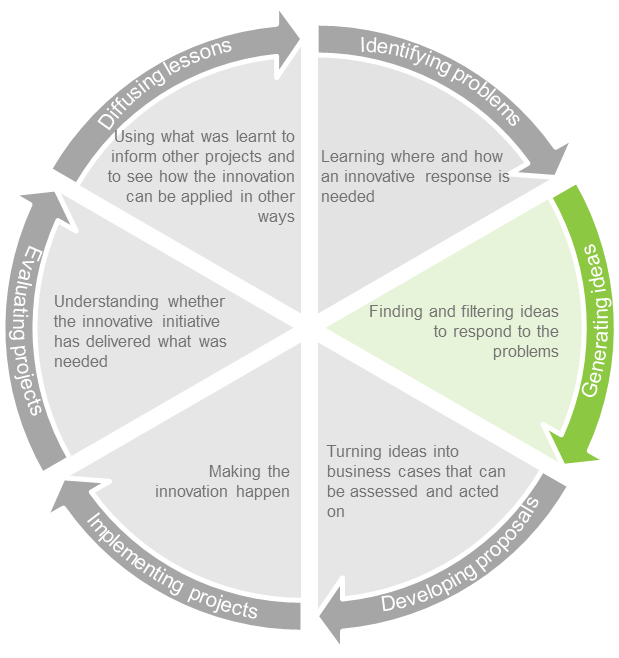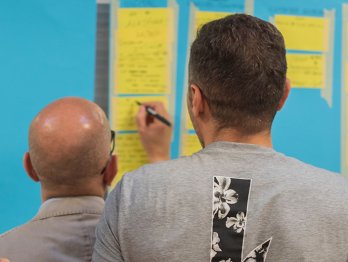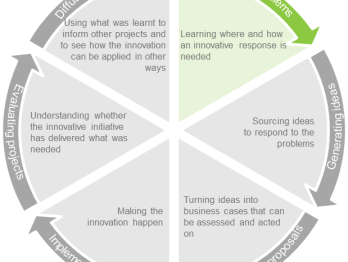What’s Possible? Generating Innovative Ideas

Today we’re releasing our ‘alpha’ version of the report about the second stage of the innovation lifecycle – generating ideas. We’re looking for feedback and constructive critique about what might have been missed, what should not be included, what is useful and what is less so. We’d also like this work to reflect your lived experience as much as it can, so we also look forward to receiving any examples or stories that can illustrate (or refute) any of the points raised here.
You can access “What’s Possible? Finding and Filtering Innovative Ideas” here Alpha Version of Innovation Lifecycle Study 2 or it can be found on the collaborative Hackpad platform.

As with the alpha version of the report on learning for innovation, the hope is to share what has been learnt so far, and to test it with others so that the final product will be useful to, and used by, public servants and their organisations around the world.
There are two old sayings that are pertinent to the innovation lifecycle work so far: “If you can’t explain it simply, you don’t understand it well enough”, and “If I had more time, I would have written a shorter letter”1. Unfortunately this draft report is by no means either short or particularly straightforward, however that should be considered a feature rather than a bug at this stage. This is for a number of reasons:
- As often talked about in innovation, it’s important to go wide before narrowing in. This process is about ensuring all the basics are considered, before then narrowing in on what is most important, or most likely to be relevant to someone needing support through the innovation process.
- As explored in the first study, we can improve our learning about something if we can make our assumptions explicit. This report does that, in the hope that the act makes it easier to identify where there might be issues or alternate interpretations.
- Generating ideas is a big topic that a lot of people, whether in the public sector or elsewhere, have experience in. This alpha version reflects the experience and knowledge of the author, of the team, and of some case studies. To draw clearer comparisons and lessons that can provide useful insights to you, we need to capture as much lived experience as possible, which requires input from more people.
- The innovation process, and how to support it, is not a settled science. There’s still a lot to be worked out, and this report reflects that we do not necessarily understand the topic well enough to be able to communicate it simply. But we hope through releasing the alpha and then beta versions that we will be able to iteratively narrow down on what’s most important.
In short – we think we’ve worked out some important things, but we’re not certain. We want to check what we’ve done with others before we develop it further in case we’ve missed the point anywhere. Then we’ll be able to distil this work into something a little more specific and practical for a wider audience that may be less familiar with the particulars of the innovation process.
With that in mind, the alpha version of “What’s Possible? Finding and Filtering Innovative Ideas” can be found on Hackpad or here Alpha Version of Innovation Lifecycle Study 2 for your comment, contributions, and critiques.
The report, produced with funding from the European Commission under the Horizon 2020 Framework, looks at:
- How idea generation is about establishing what’s possible, and its role in the innovation process
- What’s different about idea generation now, when governments have always had to find and filter ideas
- What’s involved in actually finding and filtering ideas
- How organisations (and individuals) can help provide the best conditions for the finding and filtering of ideas
- The channels and the contributors by which new ideas can arrive in an organisation
- The tools that can support organisations, teams and individuals find and filter the ideas that are right for their problem and situation.
We hope that it provides a good overview of the issues and covers the things that need to/should be considered. It is unlikely all of these issues will need to be considered for many idea generation processes, yet by exploring as many of them as we have, we hope to provide insight into what could come up.
Of course, it is worth noting that ideas generation can be a very short stage of the innovation process – sometimes government timeframes and processes require quick decisions or allow little freedom to think up and choose between different options. Yet in such cases, it may be even more important to understand the elements of ideas generation, as the risks and costs of getting it wrong are likely to be more significant.
We look forward to receiving your feedback – either through the draft on Hackpad, or by email.
If you would like to be kept informed about this or our other projects on public sector innovation, you can sign up to our mailing list, follow us on Twitter, or join our LinkedIn group.



